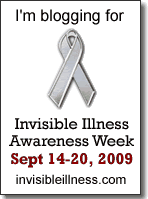
My friend Denise at Sunflower, Chocolate and Little Boys did a post about National Invisible Illness Awareness Week. I thought that I would bring back most of an older post, so that I could discuss my invisible illnesses again.
Hopefully I can educate a few folks in the world about the types of Bipolar disorder. The first type of Bipolar disorder is the one which really makes sense with the term bipolar. Here are some of the signs & symptoms (from the National Institute of Mental Health):
Bipolar disorder, also known as manic-depressive illness, is a brain disorder that causes unusual shifts in a person’s mood, energy, and ability to function. Different from the normal ups and downs that everyone goes through, the symptoms of bipolar disorder are severe. They can result in damaged relationships, poor job or school performance, and even suicide.
About 5.7 million American adults or about 2.6 percent of the population age 18 and older in any given year,1 have bipolar disorder. It is often not recognized as an illness, and people may suffer for years before it is properly diagnosed and treated. Like diabetes or heart disease, bipolar disorder is a long-term illness that must be carefully managed throughout a person’s life.
Bipolar disorder causes dramatic mood swings—from overly “high” and/or irritable to sad and hopeless, and then back again, often with periods of normal mood in between. Severe changes in energy and behavior go along with these changes in mood. The periods of highs and lows are called episodes of mania and depression.
Signs and symptoms of mania (or a manic episode) include:
Increased energy, activity, and restlessness Excessively “high,” overly good, euphoric mood Extreme irritability
Racing thoughts and talking very fast, jumping from one idea to another
Distractibility, can’t concentrate well
Little sleep needed
Unrealistic beliefs in one’s abilities and powers
Poor judgment
Spending sprees
A lasting period of behavior that is different from usual
Increased sexual drive Abuse of drugs, particularly cocaine, alcohol, and sleeping medications Provocative, intrusive, or aggressive behavior
Denial that anything is wrong
A manic episode is diagnosed if elevated mood occurs with three or more of the other symptoms most of the day, nearly every day, for 1 week or longer. If the mood is irritable, four additional symptoms must be present.
Signs and symptoms of depression (or a depressive episode) include:
Lasting sad, anxious, or empty mood
Feelings of hopelessness or pessimism
Feelings of guilt, worthlessness, or helplessness
Loss of interest or pleasure in activities once enjoyed, including sex
Decreased energy, a feeling of fatigue or of being “slowed down”
Difficulty concentrating, remembering, making decisions
Restlessness or irritability
Sleeping too much, or can’t sleep
Change in appetite and/or unintended weight loss or gain
Chronic pain or other persistent bodily symptoms that are not caused by physical illness or injury
Thoughts of death or suicide, or suicide attempts
A depressive episode is diagnosed if five or more of these symptoms last most of the day, nearly every day, for a period of 2 weeks or longer.
Bipolar type 2, which is what I suffer from, means you have the manic, or "up" times very infrequently. It's just kind of a continual depressive episode, with very occasional break. If I got to choose, I would pick Bipolar type 1 because at least sometimes you feel fantastic. People with Bipolar type 1 can often achieve dynamic things during their manic phases.
Anxiety disorders are very common with people who are bipolar. I suffer from Social Anxiety disorder as well.
This has a huge impact on the people around me. My children see me down most all of the time. My husband works 60 hours a week & has to do much of the work around the house & take care of me. My parents just don't get it. They really think I should just "suck it up." It's just that they don't get it. I tried to relate bipolar to diabetes, but they think diabetes is a "real disease" and bipolar is just feeling sad.
I'm really not sure why I'm sharing this. Maybe so people will see mental illness as an illness, just like any other. A few more prayers sent my way never hurt. I'm not looking for pity or sympathy (or nasty comments, please), I'm just putting my life out there. Maybe it just helps to write about it.
I'm currently working with my psychiatrist, to find the correct drug combination that works with my brain chemistry.
If you're still reading this really long post, thanks. I have found wonderful friends in the blogging community, & the support I have received helps & means a lot to me.






14 comments:
Mimi, thank you for sharing this. It puts Bipolar disorder into layman's terms that I can understand. My 21 year old neice is a type 1. It was many years before she was diagnosed properly and, I will admit, in the interim, she was very hard for all of us to cope with and understand. Even knowing, it is still hard to be close to her. She is either very delightful or outright ornery. We never know "who" she will be at any given time. I've heard tragic stories of people with bipolar disorder and hope that my neice will be one of the happier endings. She has gone off to live in another state with her father and we are all worried that he won't be as understanding of her as her mother is here. You are proof that it is possible to function "normally" (what is that anyway?) with this disorder. It can't be easy for you or your family. But, at least for me, you give hope that you CAN go on with this too. For that, I thank you the most. God bless you Mimi.
Thanks for sharing this will all of us. This is very personal and you are able to share it. I have had depression issues since I hit college. I can understand how you feel. I wish your parents would understand it. I thank you for saying something. It made me able to tell you about me. I do not share it with many people. But my family knows and it helps. I will be here if you need anything just let me know. Thanks again.
Mimi,
Thank you for sharing. I am praying for you sweet friend.
Thank you for raising awareness.
My brother, Aunt and Grandma are bipolar.
in zoe's case (type 1), her mania brings on horribly impulsive behavior and then psychosis and hallucinations. which is not good. i hope one day she can channel that to do positive things. nothing about having bipolar is good, no matter how you dice it. :(
when she got your gift today i told her a little about you. i'd love for her to have hope, and your story brings her hope. you have a family, are achieving amazing things academically and artistically, you have and maintain friendships - all the things i'd like for her.
please keep sharing your story!!! there are a lot of people in the world who need to hear it!
i love you this
<------------------------------>
much!!
I am so glad you did this post (and Thanks for the mention). My brother is Bipolar and I honestly had no idea what it meant. We arent close, so asking never seemed right. This was very informative and opening up like this takes guts. (I know).
So accept this HUG and a few prayers from me. You did good!
Thanks for writing this. It always makes me happy when others are brave enough to write and talk about their mental illnesses to try to remove some of the stigma as it's something I try to do as well...you're right about how people don't get that it's an illness just like other more accepted illnesses. I so hope you're able to find the right medication. I've suffered from multiple bouts of major depression...oh...it's so bad. Sending prayers your way and hoping for some really good relief for you.
Hugs you and hugs you!! You are so brave my friend! And if you get any nasty comments I will TOTALLY kick their butts!!!
Absolutely excellent clear every day break down of bipolar here. No matter how much I know or learn about bipolar there is always more I need to learn! I found you because of invisible illness awareness week.
Thank you much!
Mimi:
You're not alone... I also have Bipolar type 2, and getting family to understand that i'm ill and not "lazy" is an uphill climb. Luckily there are very understanding people in my life who know what is really going on. And they are nice enough to give me my space when i need it, but also know when to jump in and help before I can see that i need it too.
Kudos to you.
Jennifer
You are very brave to share something this personal with all of us. If only you could take an aspirine to make you feel better. However, there must be something in this bipolar disorder that makes it's sufferers very creative people with a great sense of humor.
Big hug :-)
To talk about mental illness is always a good thing. Maybe a tiny bit of stigma gets chipped away every time we open our mouths about it. I hope so.
This is a very good post: accurate, concise, well written and enhanced by the personal perspective you convey. Another way to learn about the real-world ramifications of bipolar disorder is through the medium of fact-based fiction; in this case, I'm referring to my recently released biographical novel, Broken Saint. Its foundation is my forty-year friendship with a bipolar man, and chronicles his internal and external struggles as he battles for stability and acceptance (of himself and by others). More information is available at www.eloquentbooks.com/BrokenSaint.html.
Mark Zamen, author
Hi, Mimi! Bi-Polar disorder has touched my life several times. Most recently with my 14 year old sister, who my husband and I took custody of her shortly before her 14th birthday. After a year and 9 months, the threat to our family from her behavior was real and scary. I pray for her and wish many things for her. Maybe people courageous enough to put these things out there will become a resource for her. Thank you for your words and your bravery.
Post a Comment